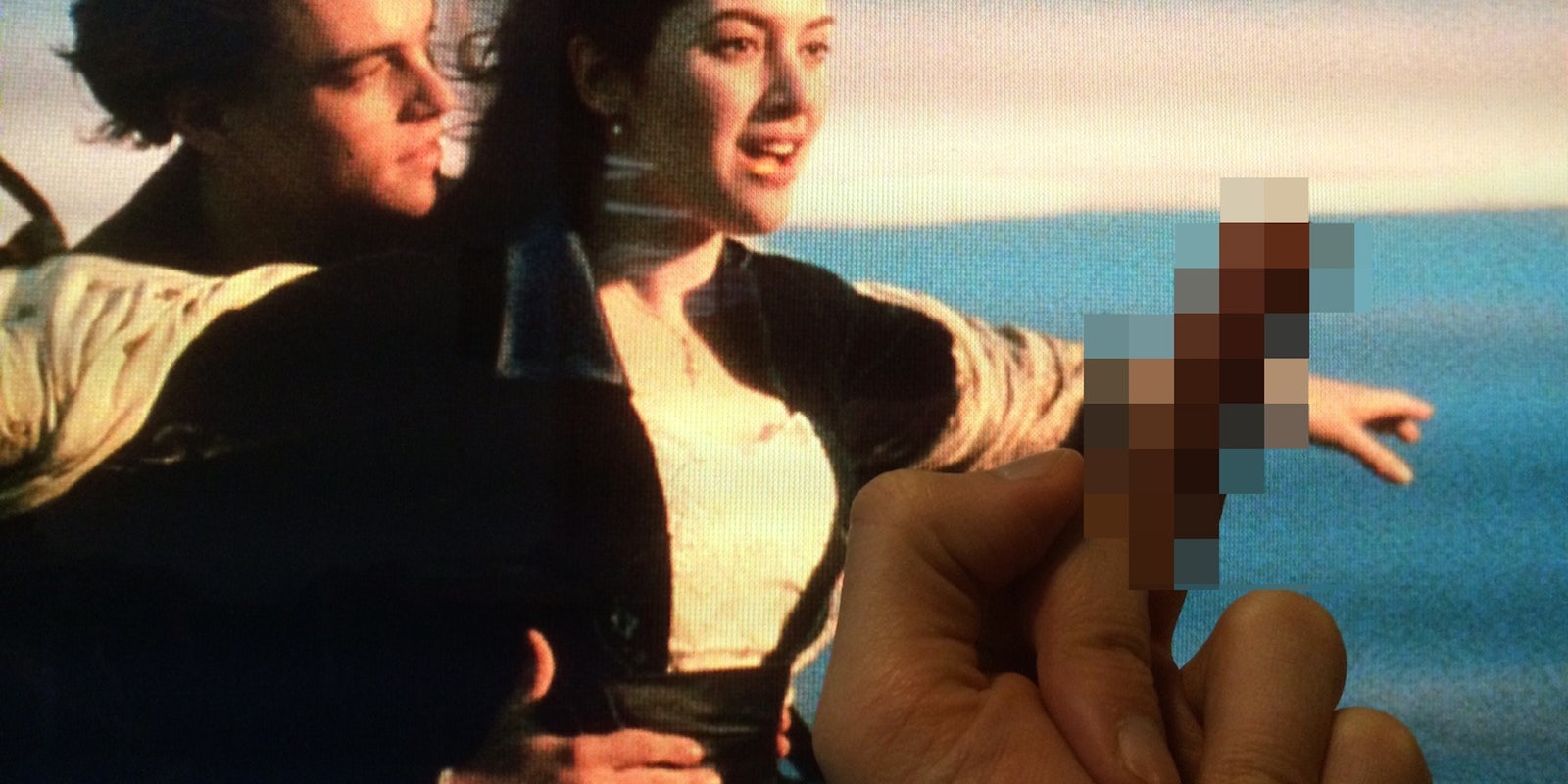This is the first time I’ve ever admitted this to anyone: Titanic sucks. I hate it. I’ve always hated it.
When I was 11, Leonardo DiCaprio was sweeping my middle school like chicken pox. My friends had seen Titanic multiple times before I managed to get around to the theater with my mom. “You’re going to sob,” one friend told me. “It’s the best movie I’ve ever seen.” By the time we hit Jack freezing to death while Rose floats on the door, I knew I was supposed to be crying, but instead I was bored and angry. As I watched everyone in the theater begin to snatch at tissues, two thoughts crystallized: You do not like this movie, and You need to love this movie.
Saying all this is mildly terrifying.
I faked crying. I told my mom and all my friends it was my new favorite. The following summer she bought it for me on double VHS, which we watched over and over as I continued to cringe under my fake tears.
Here are some more things I don’t like: The Godfather, the music of Eric Clapton, Disneyland/World, and books by Tolkien. None of these things are objectively bad. Many people I know enjoy Lord of the Rings and “Tears in Heaven,” and we have strong friendships. It is not a problem to like any of these things—I just personally do not like them. I should not be afraid to admit this out loud; in fact, it should not even be considered an “admission.”
But saying all that was mildly terrifying.
It’s almost as simple as peer pressure. In any social circle there are things you’re supposed to like, and things you’re not supposed to like, and openly differing from those expectations demands an explanation. For years, I didn’t want to have that conversation; I didn’t want to ostracize myself. It was easier to sacrifice my opinion for the sake of the group, and just to pretend to find Leonardo DiCaprio hot.
“OMG BUT YOU HAVE TO. I CAN’T BELIEVE IT. HOW CAN YOU NOT LIKE IT?!”
In March, Philip Bump wrote about the “battle for the Internet’s soul,” waged between the “no-haters” ethos of BuzzFeed and the “all-haters” philosophy of Gawker. It’s a continuation of the Snark vs. Smarm debate that pits unchecked praise against unchecked criticism. From where I’m standing, BuzzFeed is winning. It’s just more fun to participate in rampant enthusiasm, and a pleasure should never feel guilty. You should define yourself by what you love instead of what you hate, or you should just “do you.” Whether it’s Say Yes to the Dress or Vivaldi, embrace it, own it, and don’t let anyone bully you into hiding your passions.
Being a bully is what BuzzFeed CEO Jonah Peretti says “no haters” is all about. “Being a hater means writing a long thing about how a mediocre movie sucks,” he told Venture Village. “And in such a way that makes the author look cool. We don’t like that kind of stuff.” It shouldn’t have to be an explicit journalistic standard—superficial contrarianism just doesn’t make for interesting, nuanced reading—but the “period on the Internet in the mid-2000s when a lot of bloggers were very sarcastic and found everything shit” necessitated the distinction. “No haters” started as a criteria for Web content, but now it’s turned into a lifestyle.
“It’s stressful and tiresome, so sometimes it’s just easier to keep your mouth shut.”
I took to Twitter a few days ago to ask people about their “guilty hates.” I was flooded with responses, from the mundane (yoga, olives, podcasts in general) to the incendiary (Breaking Bad, chocolate, Beyoncé).
Martha Culver admitted in an email, “I’ve never liked Seinfeld, although I have watched some episodes I thought were funny, mainly because the characters were such self-obsessed jerks. I know some people like the show for that reason, but for me it got old very quickly.” You may disagree, but it’s a reasonable, non-trolling opinion—and she’s spent years hiding it from her Seinfeld-obsessed friends. “You’ll get a whole lecture/campaign from the liker to change your mind because of course this thing is so wonderful that everyone should love it,” she says. “It’s stressful and tiresome, so sometimes it’s just easier to keep your mouth shut.”
Jasmine Gulliory doesn’t like what’s probably one of the biggest cultural touchstones of the past 30 years: The Simpsons. “While I actively don’t enjoy it and have never watched a complete episode, I also don’t dislike it,” she says. “I don’t want to say, ‘UGH, THE SIMPSONS’ in the same way that I always want to (and sometimes do) for other things I feel stronger about.” However, she says, she tends to keep silent when the show comes up because she doesn’t want to deal with the inevitable conversation: “OMG BUT YOU HAVE TO/I CAN’T BELIEVE IT/HOW CAN YOU NOT LIKE IT.”
“I have nothing bad to say about it,” Gulliory says, “and I don’t want to have to deal with people trying to convert me.”
You rarely, if ever, have to enter this conversation if the tables are turned. Offering a “guilty pleasure” might get you teased, but you usually won’t be asked to explain yourself and defend your tastes—because as much as we may disagree with each other on the things we enjoy, we understand what it means to do so.
Negative feelings require an event, something specific that must have happened to make you feel that way, instead of the neutral-to-positive feelings that are supposed to be our default. Positivity is assumed, but negativity needs a reason.
Not being able to embrace your dislikes can be just as frustrating as not embracing your likes. There is a freedom in being honest about your tastes, however they align. We grow up and understand that we contain multitudes, that we’re allowed to like Descendents and Nelly. So why can’t we admit our spectrum of dislikes without the scrutiny? Why is it so hard to hate?
I went into this wary of the defensiveness that develops at these perceived slights—from those who believe Star Wars actually needs defending, or from the mansplainers and pedants and fandoms that mistake a dissenting opinion for an attack. That is, until I got pissed at someone else’s guilty hate.
The first time I saw “Beyoncé” pop up as a response on Twitter, my heart stopped, ready to load the “Grown Woman” music video as definitive proof this person was wrong. I reminded myself, OK, even my husband isn’t a huge fan of her music, and eventually I moved on.
I screamed, shut my computer, and took a deep breath.
Another person mentioned weddings. I am married. I had to pull my hands away from my keyboard to avoid typing an explanation of why my wedding was beautiful and perfect and would absolutely change her mind.
Finally, someone said she “just didn’t get” dad humor. I screamed, shut my computer, and took a deep breath.
I, like many, have used the Internet to surround myself with like-minded people. So if someone from high school posts a racist rant on Facebook, I unfriend them. Easy! If someone is mean about something I like on Twitter, I mute them. Easy! I’ve distanced myself from hurtful people I know. I’ve cut the negativity out of my life. “There’s lots of mediocre things in the world,” Jonah Peretti has said. “Just ignore those things.” It can be healthy to ignore the bad, but often we throw in with it the mediocre, the boring, and the things that just don’t interest us. And then when we’re confronted with a differing opinion, it just makes it easier to conflate disagreement with abuse.
In October, Mallory Ortberg posted “Let’s Talk About the Movies You’re Supposed to Love but Don’t” on the Toast. It was an open call for “classics that don’t do it for you, films from genres that you normally love, anything your favorite professor said would ‘change your life’ but didn’t.” One thousand one hundred and fifty-six comments later, it seemed people needed to get a few things off their chests, from the frustrations of pretending to like The Big Lebowski to suffering the boredom of The Princess Bride.
A few people were openly thankful for a place to finally say they just never liked Mad Men.
It began with people just listing these films, but then, a catharsis began to take shape. There were cries of “me too!” and “I thought I was the only one!” The plan of finding like-minded people was working. No one was forced to explain why they disliked anything (though some happily offered up the information), and no one was accused of being a philistine or a snob. The same thing happened in my Twitter mentions. A few people were openly thankful for a place to finally say they just never liked Mad Men.
Here was a place where you could be honest about your opinions without fear of retribution. Here were the like-minded people the Internet promised. We may want to define ourselves by what we love, but our mutual hates can provide just as much of a bond. This is what the “no haters” vs. “all haters” debate gets wrong: Human connections are not based on one or the other.
There are contexts in which “if you don’t have anything nice to say, don’t say anything at all” still applies. We all know those who are ready to be a contrarian for contrarianism’s sake, who relish in puncturing others’ joy, and who insist on having the last, negative word. There is no value in being needlessly snarky, but neither is there any in being unflinchingly smarmy. Both reek of inauthenticity. If we’re to be driven by our passions, let’s do it from both sides and embrace hating for a purpose. Because seriously, it feels amazing to know I’ll never have to watch Titanic again.
Sorry, Mom.
Photo by Cooper Fleishman



